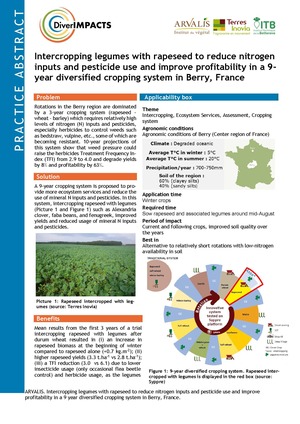Intercropping legumes with rapeseed to reduce nitrogen inputs and pesticide use and improve profitability in a 9-year diversified cropping system in Berry, France
Authors: Pierre Rochepeau, Gilles Sauzet
Problem: Rotations in the Berry region are dominated by a 3-year cropping system (rapeseed – wheat - barley) which requires relatively high levels of nitrogen (N) inputs and pesticides, especially herbicides to control weeds such as bedstraw, vulpine, etc., some of which are becoming resistant. 10-year projections of this system show that weed pressure could raise the herbicides Treatment Frequency Index (TFI) from 2.9 to 4.0 and degrade yields by 8% and profitability by 63%.
Solution: A 9-year cropping system is proposed to provide more ecosystem services and reduce the use of mineral N inputs and pesticides. In this system, intercropping rapeseed with legumes such as Alexandria clover, faba beans, and fenugreek, improved yields and reduced usage of mineral N inputs and pesticides.
English:
zenodo.org: Intercropping legumes with rapeseed to reduce nitrogen inputs and pesticide use and improve profitability in a 9-year diversified cropping system in Berry, France
French:
zenodo.org: Associer du colza à des légumineuses dans une rotation de 9 ans pour réduire la fertilisation azotée et l'IFT dans le Berry

 tap and then scroll down to the Add to Home Screen command.
tap and then scroll down to the Add to Home Screen command.